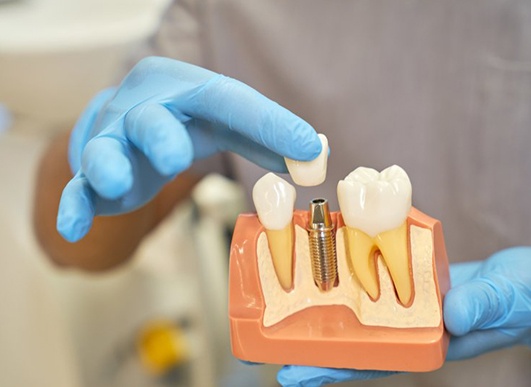Dental Implant Failure & Salvage – Houston, TX
Preserve Your New Pearly Whites
Dental implants are by far the most successful tooth replacement available; with proper care, as many as 95% of people with dental implants go on to enjoy their new smiles for life. While the risk is incredibly low, a failed dental implant in Houston, TX may still occur. In order to preserve your new pearly whites, you’ll need to recognize the signs of dental implant failure, know why it may happen, and – most importantly – contact our team at Sunrise Dental Center as soon as you notice a problem. That way, we can perform dental implant salvage as quickly as possible.

Why Do Dental Implants Fail?

By far the most common cause of dental implant failure is a form of gum disease known as peri-implantitis. Often the result of insufficient oral hygiene, peri-implantitis makes the gums swollen, red, and tender, and they may bleed easily. Without treatment, this bacterial infection may also damage the section of your jawbone holding the implant in place, causing it to loosen and ultimately fall out.
Other common reasons why dental implants in Houston might fail include:
- Physical trauma in the face that partially or fully dislodges your implant.
- Your jawbone being unable to completely bond with the implant after placement.
- An overall health condition or an autoimmune disorder that complicates healing.
Signs of a Failed Dental Implant

It’s possible for dental implants to fail at any point after being placed. No matter how long it has been, call our office if you notice any of the following:
- Pain, swelling, and/or bleeding in the first few days after dental implant surgery that increases rather than subsiding.
- Difficulty chewing without discomfort in that area of the mouth.
- Pus forming near the implant.
- Bleeding or swelling close to the implant that occurs longer after placement.
- Feeling as if your implant is loose.
How Dental Implant Salvage Works

Once you get in touch with our team, we’ll work to get you seen by one of our dentists right away. After examining your mouth, they can recommend a course of treatment depending on the cause and severity of the problem.
For example, peri-implantitis may need to be addressed with gum disease therapy and possibly a bone graft, which we might be able to perform without removing the implant. However, if physical trauma or failed osseointegration is to blame, we may need to extract the implant, treat the underlying issue, and give your jaw and mouth a chance to heal before placing another implant.

